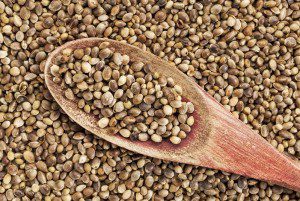Contributing Writer for Wake Up World
A group of centenarians in a Chinese village seem to have stumbled upon a veritable fountain of youth in the form of a well-known seed. Revered for their life expectancy of 100+ years, inhabitants of Bama Yao live in one of the few longevity hotspots of the world. Sharing similar characteristics with other long-lived people, residents of Bama Yao thrive on a nutrient-rich diet and enjoy a pristine environment. The secret to their exceptional life span, however, appears to be their high intake of hempseed.
Not surprisingly, hempseed is a nutritional powerhouse that is rich in many disease-fighting nutrients. Contained within this small seed are a range of vitamins, minerals, antioxidants and healthy fats — including calcium, potassium, magnesium, sulfur and iron, as well as vitamins A, B, C, E and D. Brimming with omega-3 and -6 fatty acids, hempseed is one of the best foods we can eat for a sharp mind and robust cardiovascular health. Since hempseed also provides a noteworthy level of phytol (a potent antioxidant), consuming the seed on a regular basis can help reduce the chance of developing cancer. Hempseed also tames inflammation.
[pro_ad_display_adzone id=”110028″]
Powerful healing in a tiny package
Linked with a variety of age-related disorders — such as diabetes, heart disease and cancer — chronic inflammation takes a considerable toll on health. By reducing inflammatory response within the body, we can substantially reduce our risk of disease. Hempseed is an important player in this respect. Abundant in the rare omega-6 fatty acid GLA, hempseed blocks the production of pro-inflammatory molecules. What’s more, hempseed’s GLA further reduces inflammation by eventually converting into prostaglandin, a strong anti-inflammatory compound.
Eczema — another inflammatory condition — also responds well to the healing balm of hempseed. Affecting an estimated 17 million adults and children in the United States alone, eczema is marked by an uncomfortable rash that oftentimes becomes infected. As reported by William Gamonski in Life Extension Magazine:
“To test the effects of hemp seed oil on the clinical symptoms of atopic dermatitis, Finnish researchers performed a randomized, controlled crossover trial wherein participants ingested either 2 tbsp of hemp seed oil or olive oil daily for eight weeks, followed by four weeks of no treatment. Participants then switched to the opposite treatment for another eight weeks. Subjects were instructed to maintain their normal diet and avoid skin creams.
“During the hemp seed oil phase, participants experienced a statistically significant decrease in skin dryness of 29.4% and skin itchiness of 39%, whereas no significant changes were seen during the olive oil phase. These positive changes in skin quality are believed to be related to the beneficial improvements in subjects’ plasma fatty acid profiles.”
Easy ways to add more hempseed into your life
If you would like to reap the benefits of hempseed, but don’t know where to begin, here are a few suggestions to get you started:
- Blend 1 tablespoon of hempseed oil into smoothies
- Sprinkle the seed over cereal, oatmeal and yogurt
- Mix whole seeds into baked goods like muffins, bread, granola bars and cookies
- Substitute hempseed for pine nuts in your favorite pesto recipe
- After cooking, drizzle oil over pasta, grains and soups
- Use as a replacement for butter on toast
For further inspiration on how to use hempseed in your day-to-day life, have a look at Vegetarian Times and Nutiva Kitchen.
Article Sources: http://www.medicalnewstoday.com http://www.lef.org http://www.ncbi.nlm.nih.gov http://www.chinahighlights.com http://hemp.org http://science.naturalnews.com
Previous articles by Carolanne:
- Dry Skin Brushing Can Strengthen Immunity, Spark Detoxification and Reverse Aging
- Cannabis Dissolves Cancerous Tumor in Young Infant, Deemed ‘Miracle Baby’ by Physician
- Report Finds Cancer Deaths Have Doubled in Argentina’s GMO Growing Regions
- Is Mold Making You Sick?
- Hemp – The Ultimate Cash Crop, Health Food and Environmental Savior Rolled Into One
- Slash your Organic Food Bill by Almost 90 Percent with This One Simple Method
- Autistic Boy with Higher IQ Than Einstein Discovers Gift After Removal from State-Run Therapy
- Enhance Spiritual, Mental and Physical Well-being with a Pineal Gland Detox
- Enterprising Community Aims for Total Food Self-Sufficiency with Free Edible Landscapes
- DIY $2 Self-Watering Garden Bed – Grow Produce Easily, Even in the Toughest Conditions
[pro_ad_display_adzone id=”110025″]
Please note: this article by Carolanne Wright first appeared on Natural News.
[pro_ad_display_adzone id=”110027″]







